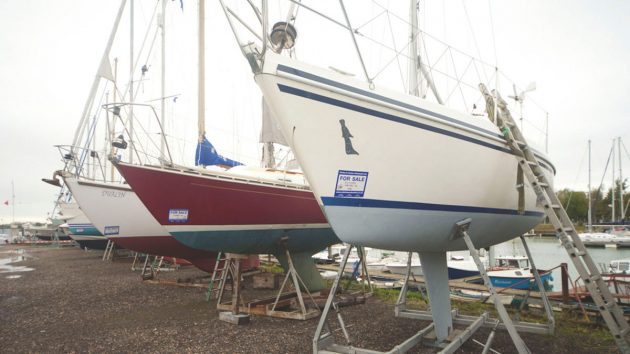Alasdair Reay, CEO of HPi-CEproof Ltd, explains what the indefinite delay in the introduction of the UKCA mark means for cross-Channel sales of second-hand boats
What the indefinite delay of the UKCA mark means for boat buying and selling
After three postponements, the UK Government announced on 1 August 2023 that it will recognise CE marks indefinitely as proof of conformity with the UK regulations.
The three previous announcements had delayed the date on which the UKCA would be mandatory until 2025, but the delays did not solve the problem: no industries wanted the burden of the new UKCA mark.
The new ruling does not apply to all sectors but does include recreational craft.
The boating industry have been CE marking for a quarter of a century and this continues, as every UK manufacturer, regardless of Brexit, wishes to continue selling their products in Europe.

Boats cruising in the EU are classed as in transit and do not need to comply with the Recreational Craft Directive.
As the new UK regulations that implement the UKCA mark are technically identical to the EU Directives, the end products sold in UK and Europe are also identical.
The UK regulations offer no benefits to the consumer and add more red tape for manufacturers. It has taken some time but the UK Government has listened.
The result is that manufacturers need only a single CE approval in order to sell in both UK and the European Economic Area, which is made up of the EU and Norway, Iceland and Lichtenstein.
Manufacturers may be delighted but what does this mean for owners and brokers who move and sell used boats between the two regimes?
The benefits are not so clear for new products.
Before we look at examples, one needs to remember two important points of law:
- A product must comply with the legislation at the point it is first sold or put into service in the territory.
- The UK Government is not recognising the EU Recreational Craft Directive (RCD) as an alternative act to the UK Recreational Craft Regulations. It is recognising European compliance as a means demonstrating compliance with the UK RCR. This subtle point is of importance later.
Example 1: moving a boat from the UK to Europe.
Nothing has changed in Europe: the UK is a third-country and the fact that UK was ever a member of EU is not relevant.
Remember point 1 above: imports must comply on the day that they are moved to Europe.
So the CE mark must be ‘fresh’ or else the boat requires Post Construction Assessment (PCA) by an EU Notified Body.
Even a Beneteau built in France with a CE certificate from a French certifier needs PCA if it is sold/moved from UK to France today.
Do owners of CE marked boats in the UK need to worry about further UKCA regulations or inspections?
A boat must comply with the regulations in force on the day it is first sold or put into service in a particular territory.
The CE mark has been accepted in the UK since 1996 and will remain so indefinitely.
A boat in the UK with a CE mark has already completed its RCD requirements.
The only trigger for reassessment would be if the boat were modified to an extent that it has undergone a ‘major craft conversion’. (This means something more than just maintenance and like-for-like replacements).
So no owner of a CE marked boat need worry about having it assessed and affixed with a UKCA mark.
Example 2: moving a boat to the UK.
If the boat has no CE mark because, for example, it comes from the USA or the boat predates the implementation of the RCD in 1998, then it will require Post Construction Assessment by a UK Body approved by UK regulations.
Why could it not have PCA done by an EU certifier with a CE mark? The answer will come later.
If the boat is CE-marked, one might think that this announcement means that the boat is considered compliant in the UK but remember point 1 above.
If the boat is coming to the UK today, it must comply with the regulations today.
So, in theory, the same situation applies as in example 1: PCA is required but this time by a UK Approved Body.
In practice, however, I cannot imagine this being enforced in the UK.
There have been three versions of the Recreational Craft Directive (and Regulations) and if the Declaration of Conformity that accompanies the boat declares the boat complies with the current RCD (2013/53/EU), I cannot see why the UK enforcement authorities (Trading Standards) would take issue with the ‘freshness’ of compliance.
Note that this version of the RCD became mandatory on 18 January 2017, so if the boat is younger than this, it could only have complied with the current Directive.

Second hand boats built before 1998, which were exempt from the Recreational Craft Directive, have now lost this exemption if sold in Europe.
But there is more trouble ahead and this takes some explaining.
Post Construction Assessment requires the ‘private importer’ to sign the Declaration of Conformity and that private importer must be located in the territory.
This is why, as stated above, a boat going through PCA for service in the UK must be UKCA marked and not CE marked.
If it were CE-marked, the importer would need to be in the EU or the boat cannot have a certificate from the EU certifier.
So UK-Approved Bodies are still required to certify used boats being imported into the UK. The problem is that there may not be any.
Currently, my company, HPi Verification Services Ltd, is the only UK-Approved Body for recreational craft.
But if all the manufacturers need only a CE certificate, why would we pay the high fees for UK accreditation as an Approved Body, to certify the odd import?
We also certify Pressure Equipment – which does not tend to sail across borders as boats do.
Continues below…
Sailing in Europe after Brexit: the essential guide
Planning on sailing in Europe? The Cruising Association shares its advice on what you need to know for a stress-free…
VAT and customs clarification for recreational boaters
Collaboration between leading leisure marine representative bodies yields positive confirmation on post-Brexit VAT interpretation
In fact, no other CE/UKCA sector has a market of used imports which is why the RCD is the only product legislation with the concept of Post Construction Assessment.
Early indicators are that UK Approved Bodies will resign their status in light of this announcement.
The government’s change of tack may be welcomed by manufacturers but it leaves problems for importers and is existential for certification bodies.
The topic of a class action against the UK Government to recover accreditation fees is already on the agenda for the next meeting of the trade body representing the UK machinery certifiers.
The UK used to have the largest share of EU certification bodies as the UK was, pre Boris Johnson, recognised for its word being its bond; UK certificates were displayed with pride.
This gold-plated UK industry now looks to be fading away, leaving a future where a UK manufacturer needs a certificate from a European certifier, to show it is compliant with EU Directives, that the UK has no voice in shaping, in order to sell their UK-made products in the UK.
Enjoyed reading What the indefinite delay of the UKCA mark means for boat buying and selling? 
A subscription to Practical Boat Owner magazine costs around 40% less than the cover price.
Print and digital editions are available through Magazines Direct – where you can also find the latest deals.
PBO is packed with information to help you get the most from boat ownership – whether sail or power.
-
-
-
- Take your DIY skills to the next level with trusted advice on boat maintenance and repairs
- Impartial in-depth gear reviews
- Practical cruising tips for making the most of your time afloat
-
-






